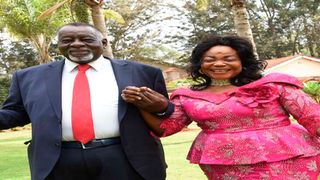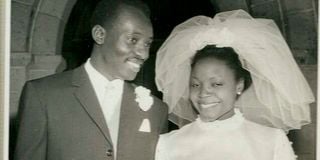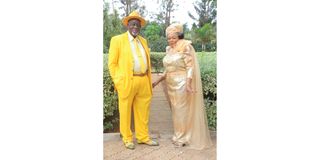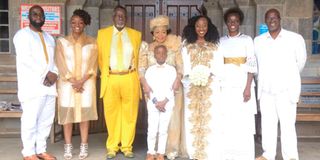
Lady Justice Joyce Aluoch with her husband Dr Joseph Aluoch at their Karen home in Nairobi on September 22, 2021.
|Lifestyle
Premium
Justice Joyce Aluoch: How we've kept the marriage flame alive for 50 years
“So, what’s the secret to a perfect marriage?” We ask with ill-disguised anticipation.
There’s an awkward moment of silence before the smartly dressed man with a distinctive grey beard, seated next to his wife, responds with as much mirth as he could muster: “You have obviously not heard the story of the person who went to a bookshop and asked for a book on what it takes to have a perfect marriage. He was told to try the fiction section.”
We are at the Nairobi home of Dr Joseph Aluoch and retired Justice Joyce Aluoch, who are celebrating 50 years of marriage this month and they have granted us a rare interview to share their story.
Notebooks, cameras and recorders at the ready, we had expected a marriage 101 homily from that question. But the unexpected light moment sets the motif for the next hour or so of our conversation with the couple: Marriages have ups and downs, they have no secret formula to share, experiences and situations are unique for every couple, they are by no means special, but they want to share their story to mark the milestone and inspire others — particularly young couples.
It is an incredible love story that started when Joyce, a student at Butere Girls High School, was told she had a visitor. It turned out to be Joseph, a young man she was not too familiar with, but whose family she knew.
Medical student
Then a university medical student, he came driving all the way to Butere, and it needed little imagination to decode this statement of intent. Their parents were friends but she had never given him much thought.
“We were not friends and were not dating at the time,” says Joyce. “He just came for a surprise visit.”
Recalling that visit, he says he had just gone to “explore” — and it worked out for him years later. That meeting in the 1960s would have more significance to their lives than either of them would have thought then. By the time Joyce was doing her A-levels at Limuru Girls, the two were dating.
Fast-forward to September 11, 1971 when the two wedded at the All Saints’ Cathedral in Nairobi. Then, Joseph had just qualified as a medical doctor while Joyce was a law student at the University of Nairobi. From then on, she became Joyce Aluoch. She would progress to be a magistrate and later a judge in Kenya and at the International Criminal Court (ICC) in The Hague.
The memories were re-lived on September 11 this year, exactly 50 years since they tied the knot at the cathedral. Now parents of three, they were back to the historic church for a celebration.
Fifty means golden jubilee and trust the Aluochs not to miss the symbolism. Justice Aluoch wore a gown with a golden colour scheme. And her husband, ever the sharp dresser, was resplendent in a yellow suit and tie. Even their facemasks were designed to stand out. The provost of the cathedral, the Rev Sammy Wainaina, led the renewal of vows. The day was also special for him because it was his birthday. The programme they were following was the same that was used on their wedding day, with only a few modifications. Somehow, that original programme had remained intact in their wedding photo album all those years.
“Joseph Aluoch, do you solemnly promise to keep the vows and the promise you made during your wedding day?”
“I do.”

Dr Joseph Aluoch and Justice Joyce Aluoch on their wedding day in 1971. The couple celebrated its 50th wedding anniversary on September 11, 2021.
It was the same answer for the next two questions. The wife did the same.
In the day’s homily, the preacher praised the Aluochs.
“I want to celebrate the two of you because you never gave up. You never threw in the towel. You never said this thing is not working. You continued in the journey, no matter how tough it was at times,” she said.
Days after this grand celebration, the couple took time off their busy schedules for an interview with Lifestyle.
It turned out to be a laughter-filled session as Dr Aluoch, at his humorous best, cracked joke after another.
“Normally, people say, ‘If two professionals get married, especially high-profile ones, it can’t work.’ It works,” says Justice Aluoch, who has not given any interview since her return from The Hague in 2018 after nine years as an ICC judge.
So, how was their courtship? It was full of car rides and dancing, especially, they said, daytime weekend dance sessions in clubs — known as boogie ya mchana —that was popular with young people at the time.
“It was convenient for those in boarding schools because they could take an exit, come and dance and rush back to be in their school by 6pm,” says Dr Aluoch.
Then a time came when the two lovebirds had to talk marriage. The relationship between their two families was about to change.

Dr Joseph Aluoch and Lady Justice Joyce Aluoch at the All Saints’ Cathedral on September 11, 2021 when they celebrated their 50th wedding anniversary.
“Our fathers were friends: Mzee Wilson Aluoch and my father, EO Josiah,” said Justice Aluoch.
“They were drinking mates,” Dr Aluoch added, laughing. “We had a chance to meet as families while we were very young. Twenty years before we even got married, we had known each other.”
Justice Aluoch was a university law student when she informed her father, who was at one time a provincial administrator, which she intended to marry the young doctor.
“My father said, ‘No, you’ve got to finish your law degree first,’” says Justice Aluoch.
After about a year and a half, the father would call the two of them. “He said, ‘I see a lot of potential in my daughter. I am the one who told her to study law. She told me last year that she wants to get married. So, can you promise me that if you get married you will not block her progress; that you will allow her to continue with her education and achieve what she wants?’,”
It was only when Dr Aluoch promised to support her in her education and career that they were allowed to get married. This conversation has always guided them on even the toughest career decisions over the years.
Did that leave Dr Aluoch in a dilemma, we ask, since many men at the time preferred women to be housewives? “Accepting this condition just came naturally. There was no dilemma,” he says.
In hindsight, the couple believes that that pledge is what helped Justice Aluoch to rise to the top of the legal profession.
“When we had a chat with my father, Daktari said he would never block my progress. And up to this minute, he has kept the promise,” she says.
Dr Aluoch believes a man allowing his wife to progress career-wise is a mark of strength, and also good for the family’s well-being.
“There are some men who feel that they should always be superior to the woman in all ways: academically, physically and financially. This is the way our grandfathers used to think; that the women were kind of second-class residents,” he says.
“But things do change and if you’ve got confidence in yourself, you have nothing to fear that you’ll be overpowered; that the woman could become the man in the house,” Dr Aluoch adds.
At 73, Justice Aluoch is still playing a role in the justice system. She is a certified international mediator who handles a number of mediation issues locally and across the world.
“I’ve never stopped learning. I like to try out new things,” she says.
Justice Aluoch also sits on the board of the United Nations Office of the Ombudsman and is also an adviser to the board of the African-Asian Mediation Association.
“I didn’t even realise that 50 years have passed. I was surprised. I guess I have been very busy in my life,” she says.
In the final three years of her stay at the ICC, she was the first vice president of the court. It was a long road from the time she started as a magistrate.
“By the time I joined the Bench, there was only one woman — Justice Effie Owuor,” she said. “By the time we were in the High Court, we were only two for almost 10 years.”
In her stint as a judge, she had many achievements, among them being the brains behind the creation of the Family Division of the High Court, which she also headed at inception.
That division, she says, has played a big role in solving family disputes.
Her husband, on the other hand, is a high-profile doctor who specialises in respiratory medicine and infectious diseases. He was at one point the chairman of the Kenya Medical Association and has headed a number of research and professional bodies locally and internationally. For years, he was a “radio” doctor at the state broadcaster, KBC, addressing health matters.
“I enjoy my work. I thank God for giving me an accommodative brain to keep up-to-date with changes in the profession. Embracing change is very important. So, I’m still lecturing and holding webinars,” he says.

Dr Joseph Aluoch and Lady Justice Joyce Aluoch at the All Saints’ Cathedral on September 11, 2021 when they celebrated their 50th wedding anniversary.
Being consummate professionals, there are times they have been forced by circumstance to be away from each other.
Just a year into their marriage, Dr Aluoch had to travel to the United Kingdom for his post-graduate. By then, his wife was still a university student. It was a tough period that she says taught her how to juggle many roles — and learn how to drive within a short time.
The most intense career decision Justice Aluoch had to make, she recalls, was when she was nominated by Kenya to be an ICC judge.
She did not inform her husband until the process was at an advanced stage.
“I remember we were in his study room,” she says.
“I told him how the process had been. And I told him that before my name was sent, I needed to know what he thought— because if I got elected to be an ICC judge, I would have to physically move to The Hague. So, he just said, ‘Congratulations, go for it. This is your opportunity’,” says Justice Aluoch.
She was not surprised by the support, and recalled the pledge her husband made 50 years ago.
Dr Aluoch adds a twist to this. He believes it is healthy for a relationship when couples are away from each other occasionally. “You know what they say? Absence makes the heart grow fonder. Being away from each other temporarily for short periods or time is actually very good for a marriage,” he says.
He gives the example of the reported problems in some marriages at the height of the Covid-19 restrictions that started last year when many couples were spending all their time together in the house.
“This being together all the time is not as good as you think,” he says with a hearty laugh.

Dr Joseph Aluoch and retired Justice Joyce Aluoch with their children Brenda (second left), Connie (third right) and Sandra. In front of Justice Aluoch is grandson Ochieng Simbiri. On the extremes are the Aluochs’ sons-in-law Kweku Makonnen (left) and David Simbiri (right).
The Hague decision leads us to a conversation on one of the couple’s pillars in the last half a century: dialogue. They reckon that they talk a lot about issues instead of sweeping them under the carpet.
“We discuss things a lot. There should be dialogue in marriage. We bring things to the table,” Dr Aluoch says. “In marriage, you have to be prepared to create time to talk.”
To which her husband adds: “We can’t move on without discussion. You’re going to agree or you’re going to disagree; fine. And you move on.”
So, besides that, is there any other secret to the longevity of their marriage?
“The secret to good marriage remains a secret,” Dr Aluoch jokes.
They both say couples themselves are the most important players in a marriage and advice from other people, while welcome, should not have an overbearing influence.
“At the end of the day, it depends on you two. If you don’t like each other, nobody can advise you to do so,” Dr Aluoch says.
They also note that it is good to give religion a place in marriage and life in general.
To them, the extended family is also an important pillar because of their traditional view. Dr Aluoch says “permanent and pensionable” should be the aspiration of any marriage, depending on the circumstances, other than “short-term contract”.
However, the couple admits they have over the years faced challenges in their marriage but came out strong because of the way they handled them, especially by talking openly.
“There have been difficult times,” Justice Aluoch says.
Dr Aluoch takes it from there: “Problems make life more interesting. I mean, even on smooth roads, there must be some bumps. It is difficulty that makes you appreciate life. And if everything is so smooth all the time, you’ll not appreciate being together.”
That brought back a memory of a time when they were not at their happiest and Dr Aluoch took her to a film screening at 20th Century theatre in Nairobi. He kept her in the dark about the film’s title until she had to discover it herself: A Guide to a Married Man.
They laughed at that memory, including a part of the film that said ‘deny, even if you’re caught red-handed’.
So, what do the two like about each other. Dr Aluoch, a master of one-liners, says:
“Everything,”
Dr Aluoch says her husband’s sense of humour is amazing. “You can’t sit with Daktari without laughing,” she says.
The famous doctor has a good reason for this: “Laughter is the best medicine.”
Sense of style
And when we ask Dr Aluoch what lessons he has learnt from parenthood, the reply is a typical one with a light touch.
“It didn’t teach me anything. I taught it something.”
Ultimately, Dr Aluoch has to excuse himself from the interview to attend to something urgent in hospital. Justice Aluoch says she was used to those abrupt departures and calls at odd hours.
One thing that stands out, as our photojournalist asks them to pose, is the sense of style. .
“He’s always been fashionable. He always dresses up even when in the house. He feels comfortable when he is smart,” Justice Aluoch says.
As we leave the compound, we have some take-home points, among them this from Justice Aluoch: “I believe in marriage. I believe marriage works. It brings stability to the family, to the society. It is something that I will always encourage where possible.”





